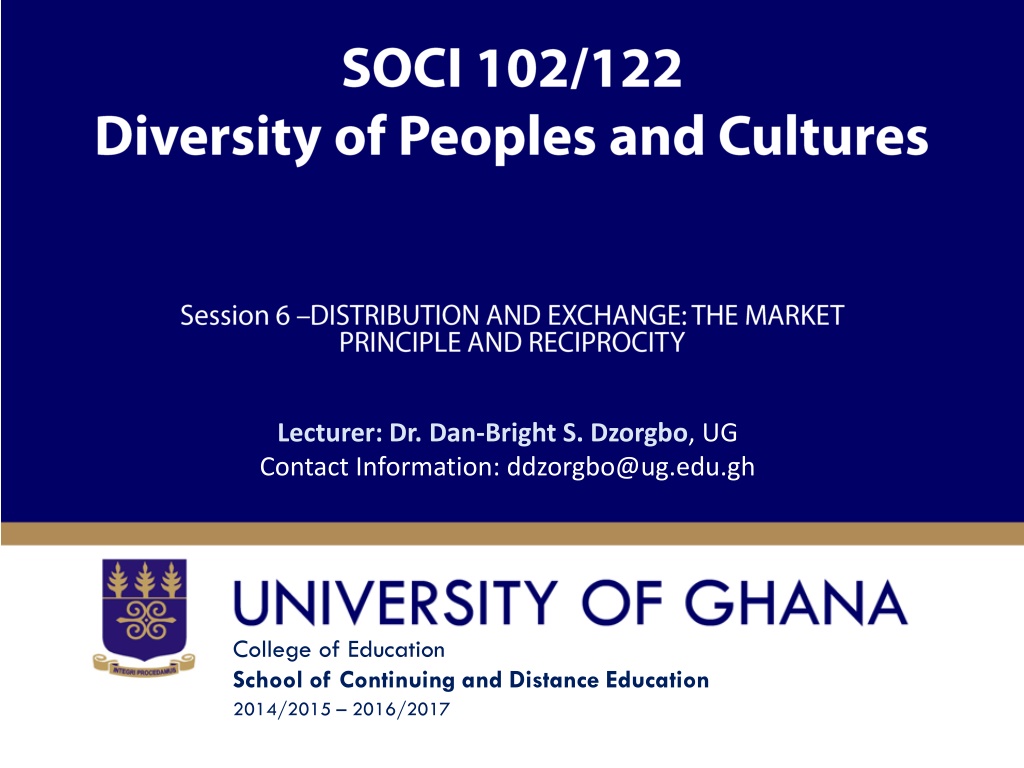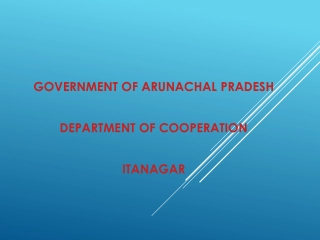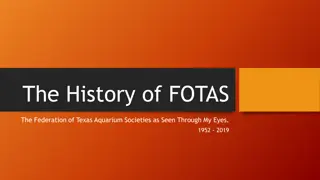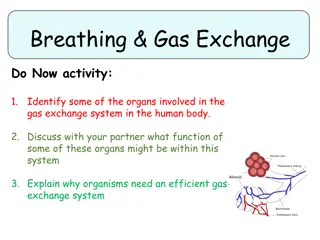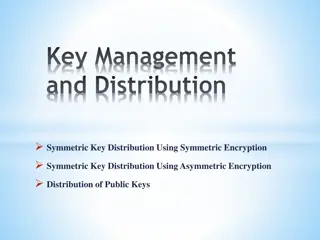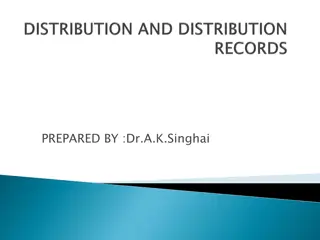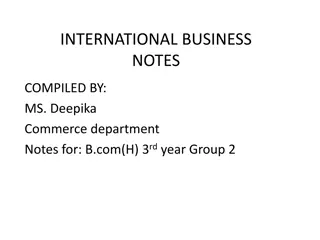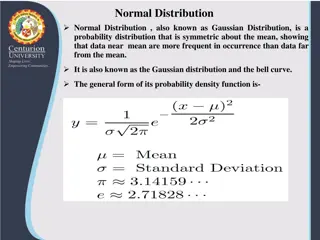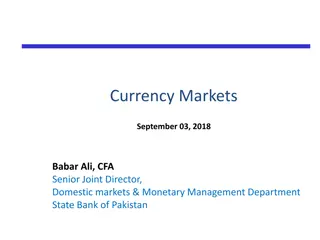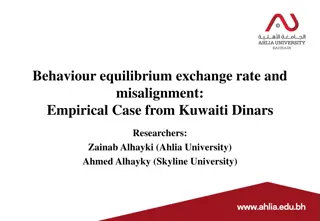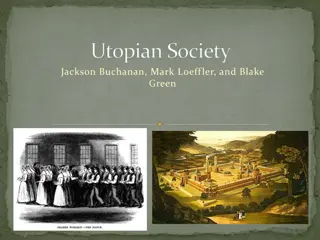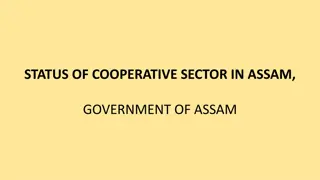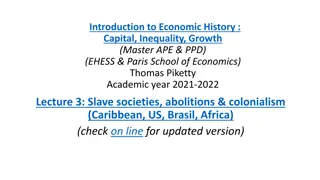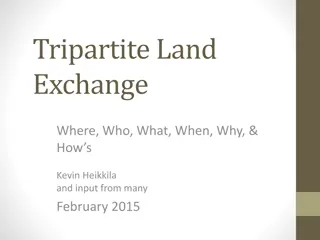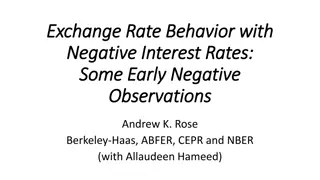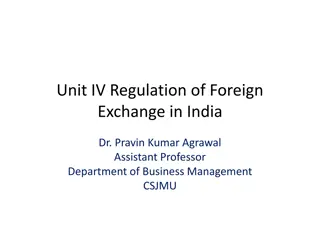Understanding Distribution and Exchange in Different Societies
This session led by Dr. Dan-Bright S. Dzorgbo at the University of Ghana explores how various societies handle the distribution and exchange of goods and services. It delves into the roles of market principles and reciprocity, shedding light on different approaches to economic systems. Through discussions on motivation and human behavior, students gain insights into the diverse mechanisms at play in modern economies. The reading list provided offers additional resources for further exploration of sociological concepts.
Download Presentation

Please find below an Image/Link to download the presentation.
The content on the website is provided AS IS for your information and personal use only. It may not be sold, licensed, or shared on other websites without obtaining consent from the author. Download presentation by click this link. If you encounter any issues during the download, it is possible that the publisher has removed the file from their server.
E N D
Presentation Transcript
Lecturer: Dr. Dan-Bright S. Dzorgbo, UG Contact Information: ddzorgbo@ug.edu.gh College of Education School of Continuing and Distance Education 2014/2015 2016/2017
Session Overview Introduction This session deals with how different societies deal with the distribution and exchange of goods and services. In modern societies, goods and services are distributed through the price mechanism and the search of profit and minimization of cost/prices of goods guide both producers and consumers. In this case, both producers and consumers are said to be rational decision makers. However, in some other societies, exchange is not dictated by the search for profit, but rather other social values, through the principle of reciprocity and there exist different types of reciprocity in human societies. Although we make such as sharp distinction between these two, in reality both market principle and reciprocity are found in varying degrees in many modern societies. Objectives At the end of the session, the student will be able to: explain what is meant by distribution and exchange explain what is meant market principles determining exchange and distribution explain the principle of reciprocity identify the various types of reciprocity Slide 2 Dr. Dan-Bright S. Dzorgbo, Sociology Dept. UG
Session Outline The key topics to be covered in this session are as follows: Topic One: Distribution and Exchange Topic Two: Market Principles and Redistribution Topic Three: Principles and Types of Reciprocity Slide 3 Dr. Dan-Bright S. Dzorgbo, Sociology Dept. UG
Reading List Assimeng, M. (1999), Social Structure of Ghana, Tema, Ghana Publishing Corporation. Kottak, C. P. (2004), Cultural Anthropology, Boston, McGraw Hill Corporation. Kottak, C. P. (2004), Anthropology: The Exploration of Human Diversity, Boston, McGraw Hill Corporation. Nolan, P. & G. Lenski, (2004 or any of the newer editions), Human Societies: An introduction to macrosociology, Boulder Paradigm Publishers. Nukunya, G. K. (2006), Tradition and change in Ghana: An introduction to sociology, Accra, Ghana University Press. Sanderson, S. K. & A. S. Alderson (2005 or its newer editions), World societies: the evolution of human life, Boston, Pearson Education Inc. Slide 4 Dr. Dan-Bright S. Dzorgbo, Sociology Dept. UG
Topic one: Distribution and Exchange Every human society engages in production, distribution (exchange) and consumption of goods and services and some human behaviours and social organizations are attached to all these activities. One may ask what motivates people in different cultures to produce, distribute (or exchange) and consume Answering these questions leads us to the issue of motivation that lies behind all these activities Slide 5 Dr. Dan-Bright S. Dzorgbo, Sociology Dept. UG
Topic One: Distribution and Exchange (cont d) In the developed, modern or industrial world, people produce, exchange and consume goods and services on the principle of scarcity of resources in relation to human wants and needs Because human wants and needs are limitless and the resources for satisfying them are limited, humans have to economize In economizing, every individual (be it in production, distribution and consumption) is thought of as calculative and rational and will like to maximize profit as much as possible So in the developed world, the market operates to bring together producers and consumers who interact to determine prices The price that is arrived at for a particular product or service is judged as the one that satisfies all participants in the market The price is determined by how much of the product is supplied and how much of it is demanded: hence the law of demand and supply operating in the market. Therefore, the market decides price and the allocation of resources in society Slide 6 Dr. Dan-Bright S. Dzorgbo, Sociology Dept. UG
Topic Two Market Principles and Re-distribution So in the developed mostly capitalist societies, the operation of the market decides how the means of production: land, labour, financial capital, natural resources, technology are acquired for production. The buyer and seller are motivated to make profit or the get much value or money s worth. However not all societies place priority on making profits when the exchange and consume products, services. So we have market principle operating more in the developed world and principles of reciprocity operating more in the less developed world. However, by today s standard most societies operate to varying degree all the above distributive mechanism Slide 7 Dr. Dan-Bright S. Dzorgbo, Sociology Dept. UG
Topic Three: Principles and Types of Reciprocity In the less developed societies, a lot of exchanges do take place through the reciprocity People cherish other values than profit, so profit will not always be the determining factor of exchange People reciprocate and exchange products among equals who are related mostly by kinship, marriage, adoption or close personal relationships. They value these social goods, social relationship and friendliness than pure profit so the market does not always operate Principles of reciprocity operates more among foragers, cultivators and pastoralist Three types of reciprocity are found depending on (i) how closely related the parties are to each other in the exchange and (ii) How quickly and unselfishly gifts/goods are reciprocated. The three types are (i) generalized reciprocity, (ii) balanced reciprocity and (iii) negative reciprocity Slide 8 Dr. Dan-Bright S. Dzorgbo, Sociology Dept. UG
Topic Three: Principles and Types of Reciprocity (cont d) The three types of reciprocity found in non-industrialized societies are: Generalized reciprocity: this happens when someone gives another persons something but does not expect any concrete and immediate return as parents give things to their children. Children are only to show respect, love, honour, loyalty, etc. (ii) Balanced reciprocity: this happens when people are more distantly related than members of the same household, family. Here because of distance, the giver expects something in return although immediately. However if the gift is not reciprocated in the future the relationship would be strained (iii) Negative reciprocity: This happens with strangers and people who are distant. Because the parties may not see each other again, they want something in return for what they are giving out. Exchanging with outsiders is full of ambiguities, suspicions and mistrust. The more the social distance between the parties are the more parties want something in resturn. Slide 9 Dr. Dan-Bright S. Dzorgbo, Sociology Dept. UG
Topic Three Principles and Types of Reciprocity (cont d) In modern societies, because many people are strangers there is the market so that all parties get something quickly in return for whatever they are exchanging. Generalized reciprocity and balanced reciprocity are based on trust and intense social ties, whereas negative reciprocity exist because of less trust and weak social ties hence every party endeavours to get something in return in the exchange. This situation often times leads parties to engage in cagey and deceitful businesses with others. However, it must be noted that all these exchange mechanisms are found in varying degrees in all societies. Slide 10 Dr. Dan-Bright S. Dzorgbo, Sociology Dept. UG
Topic Three Principles and Types of Reciprocity (cont d) Read on the following redistributive practices: (i) Potlatching among the people of North Pacific Coast of North America (ii) The Kula Ring (iii) Use your sociological imaginations and provide examples of re-distributive practices in your society, Ghana, Nigeria, etc. Slide 11 Dr. Dan-Bright S. Dzorgbo, Sociology Dept. UG
CONCLUSION In this sessions, we have discussed the following: The different modes of distribution and exchange The issue of scarcity of resources in relation to wants and needs and why humans are thought of as rational. The operation of the market for the maximization of profits Principles and types of reciprocity and set examples Slide 12 Dr. Dan-Bright S. Dzorgbo, Sociology Dept. UG
